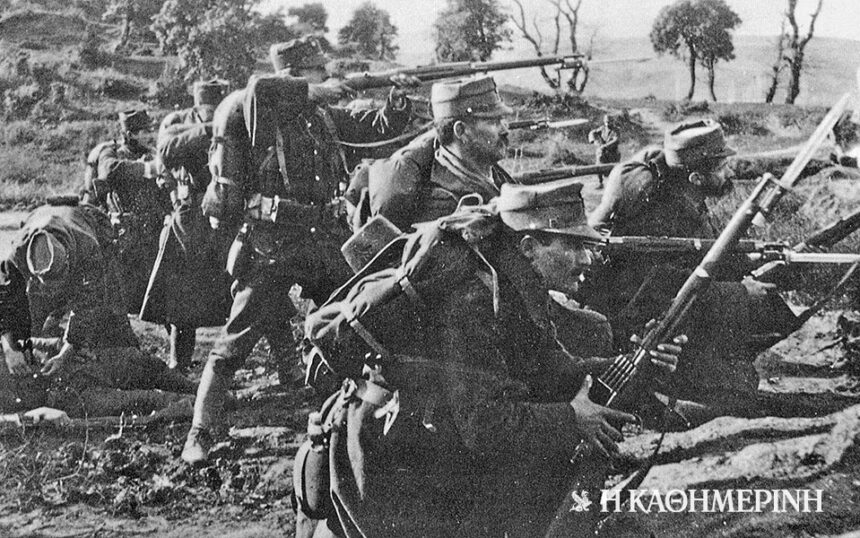The end of the 19u and the beginning of the 20thuh h. were marked by major rearrangements in international political, economic and military relations, which greatly affected the global balance of power, overturning established perceptions and imposing new conditions. In the Balkan Peninsula, the period was characterized by stormy changes, more or less sweeping away all the states of the region. A revival of the Eastern Question, i.e. the case of dividing the territories of the declining Ottoman Empire, was observed. The Balkan states participated together with the Great Powers of the time in the competition for the claim of the Ottoman territories.
Several factors contributed to the formation of the Balkan Alliance in 1912, which made possible the rapprochement of the Balkan states. Initially, the policy of Turkification, which the Young Turks implemented at the expense of the Christians, destroyed any hope of the Ottoman Empire’s evolution into a cosmopolitan state. In addition, after the Anglo-Russian rapprochement of 1907, came British reservations about the eventual dissolution of the Ottoman Empire, which overturned London’s policy until then. Another factor was the defeat of the Ottoman Empire in the war with Italy (1911-1912). In its attempt to force the Sublime Porte to accept the annexation of Tripoli and Cyrenaica, Italy occupied the Dodecanese in May 1912, which it held until 1947. The Ottoman Empire clearly showed its inability to defend the its lands.
The Albanian uprisings of the years 1910-1911 were a decisive factor for the formation of the Balkan Alliance. The uprisings mobilized the leaderships of the Balkan states, who did not want the territories claimed by them (Greece-Epirus, Serbia-Kosovo and Montenegro-Shkodra) to be included in a future Albanian state. Finally, the reactivation of Russia in the Balkans after its defeat in the Russo-Japanese War (1904-1905) played an important role.
Under the influence of these factors, the Balkan states began to study in 1912 the possibility of solving the Eastern Question by war. As early as 1910, secret negotiations had begun between the Serbian and Bulgarian governments based on the Russian proposals for the distribution of Macedonia. The two countries reached an agreement in February/March 1912. The Serbo-Bulgarian Treaty of Friendship and Alliance provided for the distribution of territory in the Balkans and appointed the Russian Tsar as arbitrator to resolve any disputes that arose.
The Prime Minister of Greece Eleftherios Venizelos estimated that Greece should not be absent from the Balkan Alliance under formation. Bulgaria and Serbia seemed determined to declare war on the Ottoman Empire without Greece. In such a case, the borders of Greece would be fixed at Aliakmons and the area for which Hellenism had fought in the previous years (1904-1908), Macedonia, would pass into Bulgarian or Serbian hands. Although there were many outstanding issues in Greek-Bulgarian relations, Venizelos reached out to Bulgaria and in May signed a treaty of a defensive nature. The Greek-Bulgarian agreement did not touch upon the distribution of territories in Macedonia. Venizelos believed that the territorial debate would highlight the huge differences between the two sides, making it impossible to reach an agreement.
The Bulgarian side was imbued with a spirit of hegemony in the Balkans. The Bulgarian officers underestimated the combat potential of the Greek army, counting only on the help of the fleet. They believed that the Greek army would not succeed in breaking the Ottoman defensive positions in Thessaly. As for future gains for Greece, the Bulgarian leadership believed that the cession of Crete and some Aegean islands was enough to satisfy its aspirations.
At the end of August 1912, Ferdinand’s Bulgaria decided to declare war on the Ottoman Empire. He immediately came to an agreement with Montenegro for its participation in the war. At the same time, Serbia under Prime Minister Nikola Pasic took the decision to participate in the war against the Ottoman Empire. On September 17/30, Sofia, Belgrade and Athens declared general conscription. On September 24/October 8, Montenegro severed diplomatic relations with the Porte, and a few days later on September 27/October 10, the country’s ruler Nicholas declared war.
The mediation of the Great Powers did not bear fruit. On the night of 3her/16her October the Gate recalled its ambassadors from Sofia and Belgrade. The next day, Bulgaria and Serbia declared war on the Ottoman Empire. The attempt of the Gate to detach Greece from the Balkan Alliance, by giving it Crete, failed. On October 5, Greece in turn declared war on the Ottoman Empire. “Greece, armed with its Allies, inspired by these sentiments and bound by common obligations, undertakes the holy struggle of justice and freedom of the oppressed peoples of the East”, King George I said, among other things, in his address to the Greek people ΄.
The Balkan Wars were seen as a continuation of the Palingesian War, a new 1821. Greece expanded its territories by incorporating Macedonia, Epirus, Crete and the islands of the Eastern Aegean. With the Treaty of Bucharest (July 28/August 10) Greece ratified its sovereignty over these territories.
Column Editor: Myrto Katsigera, Vassilis Minakakis, Antigone-Despina Poimenidou, Athanasios Syroplakis








